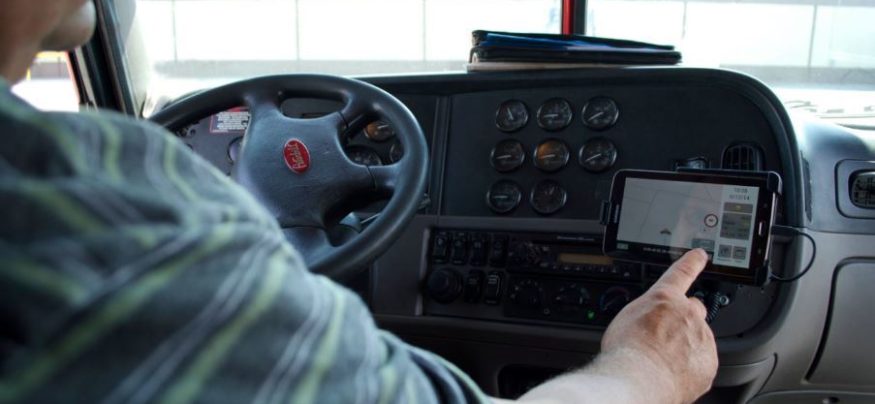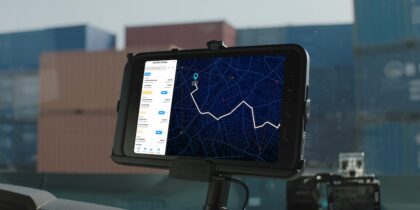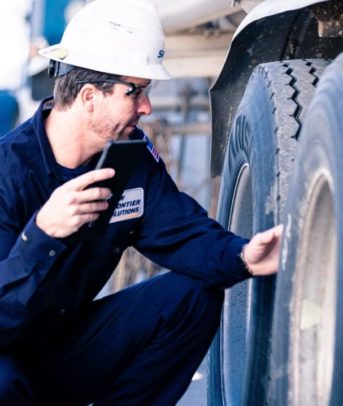In the cab of an 18-wheeler, in the hands of a railroad conductor or in the seat back of an airliner, rugged tablets are commercial and industrial devices that can be durable and viable long term. Consumer-level products might have a competitive cost of acquisition, but industrial-strength devices have durable hardware and thorough lifecycle support that reduces the total cost of enterprise ownership. In fact, ruggedness, durability and uptime were the top characteristics considered when evaluating commercial mobile devices, according to a 2012 study conducted among logistics and warehouse managers by Peerless Research Group.
Shifting From Consumer-Level to Rugged Tablets and Mobile Devices
Nearly 75 percent of mobile phone subscribers in the U.S. own smartphones, with similar penetration in other parts of the world. That means many people have experience with consumer-level devices in their home life. However, in logistics fields such as transportation, tablets seem to be taking the lead over increasing smartphone adoption numbers. The Peerless survey found that logistics managers who plan to use Android™-based tablets, 46 percent of those surveyed, outnumber those who plan to use smartphones, 31 percent. There are differences in how these devices are used: Those requiring navigation applications are more likely to use a smartphone via a mobile broadband connection, but for more data-intensive tasks, tablets are the preferred platform. Most of these devices are consumer grade; few have interacted regularly with rugged tablets or mobile phones and understand the potential benefits.
Rugged tablets, smartphones and mobile devices with cases provide robust performance in demanding environments. Whereas consumer-level devices work for everyday use at the office, their hardened counterparts are built to survive the dust, dirt, vibration, accidental drops, moisture and other hazards in industrial workplaces. Consider an onboard entertainment system on an airliner. Mounted to the back of the passenger seats, tablets are a great tool for providing multimedia entertainment, onboard food and beverage purchases, online shopping, reservations and travel guides. These additional functions contribute to a more pleasant flying experience and represent an ancillary revenue stream. If devices are out of order, they become a source of customer dissatisfaction and therefore lost revenue. Rugged mobile devices are built to withstand high-volume interaction, including the screen taps and accidental impacts that occur as part of everyday usage, making them a cost-effective choice for airliners.
Similarly, the trucking industry can benefit from rugged tablets’ long-term durability, especially because devices have to be ready all the time. Inside the cab, modern truck drivers often keep an electronic log book, receive routing updates from the dispatcher and plans their journeys all on a dash-mounted tablet. The average long-haul trucker will cover 100,000 miles per year over roads of varying smoothness, meaning that devices are exposed to thousands of hours of small vibrations, speed bumps and weather extremes. Rugged devices can withstand these regular shocks that come with industry use, keeping drivers constantly and reliably connected throughout their journeys.
From Bricks to Modern Technology
In the transportation industry, only rugged mobile devices are up to the task. Small, robust versions that use proprietary software and communications channels, commonly called bricks, have been in the market for years and have seen great success. However, today they seem out of date and hard to use. Their small screens and hard-to-push buttons don’t compare to modern touchscreen capabilities. Because most employees have smartphones and tablets for personal use and are therefore comfortable with them, modern rugged tablets and mobile phones seem like a logical choice.
The Samsung Galaxy Tab® Active is a rugged tablet designed from the ground up for tough commercial use in enterprise environments; it’s ready to meet the everyday demands and security needs of business users. The built-in protective case provides water and dust resistance, shock resistance and screen protection that make it ideal for use in rough, demanding workplaces. Yet, its 8-inch LCD screen that’s readable in daylight, along with its replaceable, high-capacity battery, make it appealing and functional to the same extent as a consumer-level device. To adapt the Galaxy Tab® Active for various transportation uses, Samsung has partnered with companies such as Gamber-Johnson to create innovative mobile solutions. Gamber-Johnson and Samsung collaborated on a series of vehicle-computer mounting systems and components to help truck fleets stay connected.
Today, more employees are on the move, and they need to carry technology that will stand up to the demands of the job at hand. Customer satisfaction, as well as employee engagement, is connected to technology’s ease of use and reliability. Commercial jobs require commercial devices; rugged tablets and smartphones are designed to deliver a satisfying, reliable user experience regardless of the conditions.








